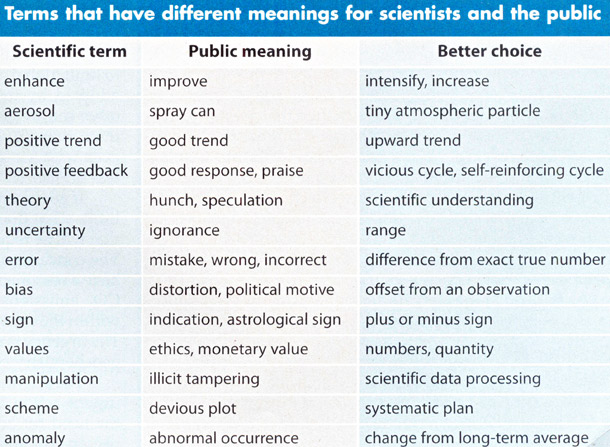The American Geophysical Union blog has a link up to a very interesting table, and I feel strongly enough about this topic that I want to share it with you. It’s a list of words scientists use when writing or otherwise communicating science, what the scientists mean when they use that word, and most importantly what the public hears.
[Click to enverbumnate.]
I’ll admit, when I read it I laughed. But then my chuckle dried up when I realized just how dead accurate this is. And the smile pretty much left my face when I read that this table is from an article called "Communicating the Science of Climate Change," by Richard C. J. Somerville and Susan Joy Hassol, from the October 2011 issue of Physics Today.
Yup. I think they have a pretty good point.
My career at the moment could pretty much be called "Science Communicator". I do it here on this blog, I do it on Blastr and in Discover magazine, and when I give talks. Before that (and I guess it’s an occupation that never really leaves you) I was a professional scientist for many years. My training ran deep: 4 years undergrad, 6-7 in grad school, then a decade or so of research after that. I could toss around the phrase "Don’t over-iterate the Lucy-Richardson deconvolution algorithm or else you’ll amplify the noise and get spurious data spikes" with the best of ‘em.
As a science writer, though, I can’t use that! I have to say, "Cleaning up a digital image means using sophisticated mathematical techniques that can sometimes mess the image up and fool you into thinking something’s there that really isn’t."
I hope you can appreciate the difference.
So when I write, I try pretty hard to make the science topic accessible without "dumbing it down". I assume my reader is intelligent, but unfamiliar with the concepts I might be discussing. I try to define words if a reader might not know them, or link to someplace they can get more info if they need it.
But as that table shows, there are plenty of words I use all the time that someone else might know, and think means something else. And this is incredibly important, especially if a science writer — as happens more and more often these days — needs to defuse some sort of political spin thrust upon a topic. A classic example in the wholly-manufactured Climategate "controversy". A lot of hot air was generated over the use of the word "trick" in the stolen emails — which most people interpreted as meaning the scientists did something underhanded and sneaky to hide something important. In reality, we use that word to just mean a method of doing something that’s clever. It’s like saying, "The trick in never losing your car keys is to always hang them on a hook by the door that leads outside." See the difference?
But over that, political battles are won or lost.
There are times I fret over a word in a post. It took me a while to start using the word "denier" instead of "skeptic", for example, but the difference is important. I’ve fought for years to teach people that skepticism is not cynicism or denial; it’s asking for and looking at evidence logically and rationally (in a nutshell). What’s funny is that now the media uses phrases like "climate skeptic" when talking about some people who are not skeptics, in that they are not looking at the evidence logically and rationally. They look at evidence so they can figure out how to spin it, cast doubt in the mind of the public over something that is actually a fact.
That’s why I call it "denial". The word fits, and I intend to continue using it when it does.
I could go on and on.
But here’s the point: communication isn’t simply casting out information from atop a tower. There are two parts to it: presenting an idea to someone, and them understanding it. Sometimes we have to change the way we word things to make that second half happen. Otherwise we’re shouting all the facts in the Universe to an empty room.
Tip o’ the thesaurus to Joanne Manaster.



 The story of industries paying lobbyists to influence legislation that benefits their business is nothing new—but what about when that industry is a privately-owned and operated prison system?
The story of industries paying lobbyists to influence legislation that benefits their business is nothing new—but what about when that industry is a privately-owned and operated prison system? 